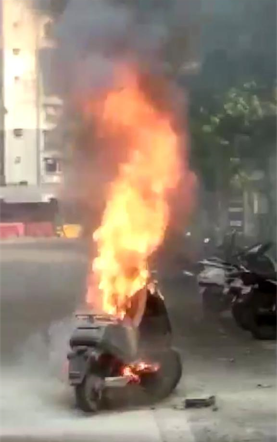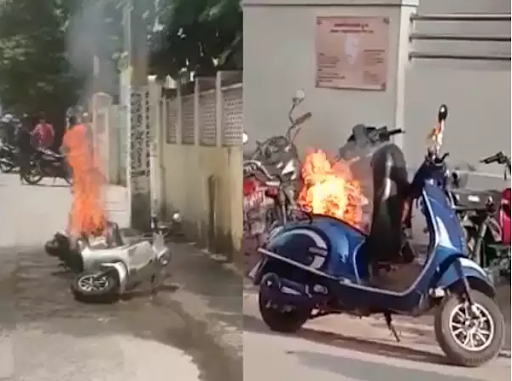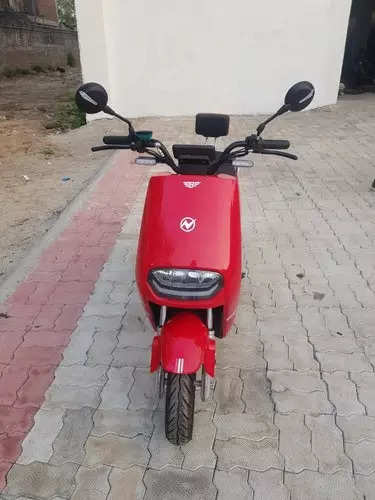
In the fourth such incident since September, video of yet another electric scooter on fire emerged recently once again highlighting the need for stringent safety regulations and their enforcement in India.
The video is from Andheri in Mumbai and the scooter is X1 from SaharaEVOLS–a Sahara Group company that ventured into the EV space in June 2019. Earlier this year, Subroto Roy’s firm tied up with Gwalior based SuperEco Automotive for manufacturing 50,000 two and 6,000 three wheelers. The X1 is approximately priced at Rs 80,000 and has a 1.9 KWh lithium ion battery with a range of 80 kilometers and a 250 Watt motor.
In the nearly three minute long video, plumes of smoke can be seen billowing out of the parked scooter initially before it is engulfed in fire. It also shows how attempts to douse it with water fail and the blaze could be controlled only with the help of a fire extinguisher.
When contacted, SuperEco said they were scrutinizing the lapse and have reached out to their third party vendor from Bangalore. Queries to SaharaEVOLS went unanswered. We will update when they respond.”As we make vehicles only and do not make batteries in-house, batteries come from a third party vendor,” a spokesperson for Super Eco told ETAuto. “We have taken up this matter with the battery supplier and it is under scrutiny to identify the root cause.”
This is not a one off. Earlier this year, two electric scooters from Pure EV caught fire followed by another from Okinawa. There has been a gradual increase in the number of fire incidents commensurate with the rise in sales across the globe as well. Earlier this year General Motors expanded the recall exercise for its Bolt EVs by 73,000 vehicles to now include every Bolt ever manufactured, at a cost of nearly $ 2 billion. Similarly South Korean auto giant Hyundai recalled 82,000 EVs after 13 incidents of fire were reported in its compact crossover Kona electric. This includes 456 units of the car that it sold in India.
With a significantly lower number of moving parts, EVs are relatively simpler to produce. Yet, the battery that is at the heart of the vehicle is complex and the vehicle’s overall safety depends on the efficiency of the battery management system–how well the battery is cooled and how good the insulation of the pack is from outside elements.
While Super Eco said it sourced the battery from a local vendor, India does not produce lithium ion cells of its own which invariably is imported mostly from China. Industry sources say that is where most of the grey areas exist.
“In the Indian EV segment there is a lot of dependence on imports especially for batteries so a mechanism needs to be put in place so that safety-related incidents can be avoided or reduced,” said Suraj Ghosh, associate director, IHS Markit. “The safety concerns are more in the two wheeler category as it’s dense with new companies that may not have the purchasing capacity or the access to high grade batteries from credible suppliers; but have to face cost pressure to qualify for the FAME and other state-level incentives and be competitive.”
Low entry barrier, the promise of high growth and a ready made sourcing destination in China–world’s largest electric vehicle market, has led to scores of companies mushrooming almost overnight. With the traditional players not fully committed to the EV story, the field is wide open for newer players to emerge. Not everybody is a long term player and the fear is non serious players cutting corners to end up giving the overall industry a bad name.
“Now, the stage which India’s EV journey is currently at, any adverse incident could potentially dent the perception of EVs among buyers,” Ghosh of IHS added. “So, it’d be advisable if the industry comes up with a solution to address this, probably a self-certification program or one assisted by the concerned industry bodies.”
Watch: Video of SaharaEVOLS’ X1 on fire surfaced on social media:

















